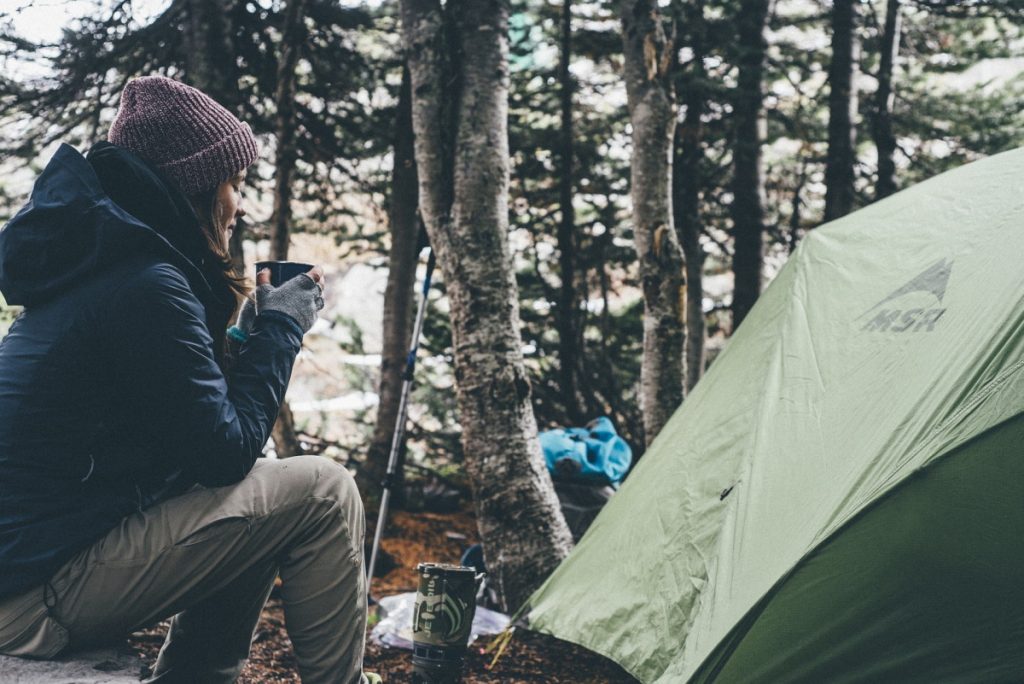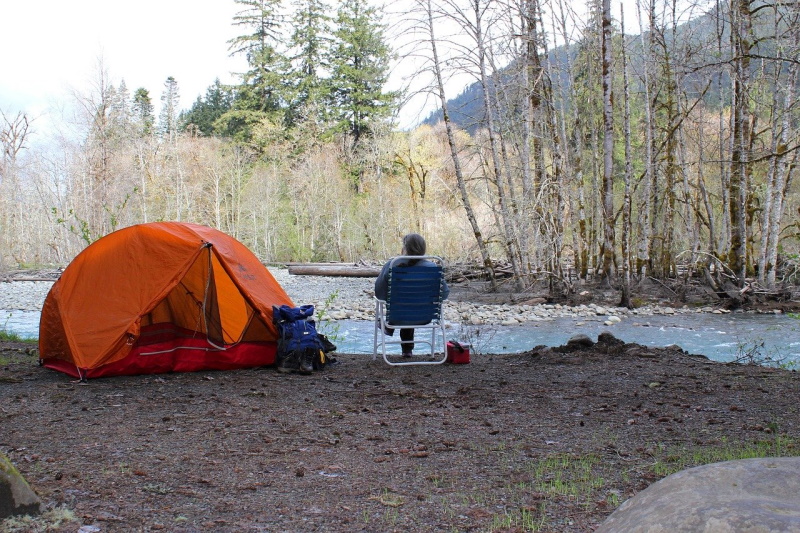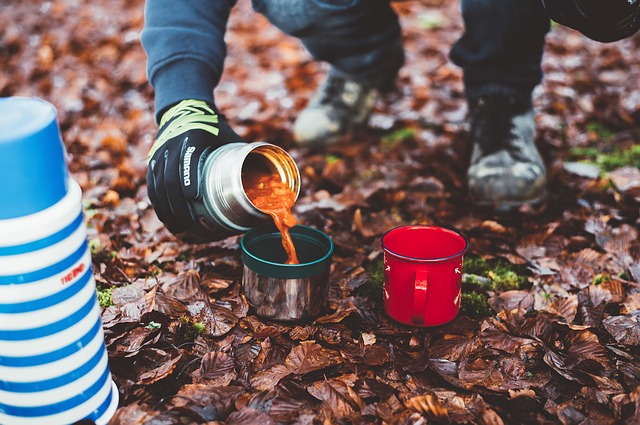Camping with friends and family is fun. However, you will barely get time to enjoy the peace and quiet of nature, since you will be preoccupied the entire time. But when you go on a solo camping trip, you will have a chance to experience the serenity and the stillness of the great outdoors, without any interruption. Furthermore, going for a solo camping excursion lends you the chance to live slowly at your own pace, immerse yourself in nature, enjoy the beautiful views and leave all the worries behind. However, solo camping also presents numerous challenges as well as safety risks. If the thought of camping alone in the wilderness makes you nervous, here are some safety tips that can help to make your trip more enjoyable.
Research the Area
Whether you will be car camping, RV camping, backpacking or hiking for a few days, it’s important to gather as much information as possible, regarding the area that you intend to visit. First, check for the predicted weather conditions. If there is a chance of a storm or other extreme weather conditions, it’s highly advisable to postpone the trip or even choose another campsite. You also need to research the camping areas, the wilderness, the trails that you intend to hike if any, the flora and fauna of the area, and landmarks as well. Ensure you acquire an up-to-date map of the area and you use it to study your route, check for water sources, the topography, alternative trails as well as available water sources. It’s also important to understand the terrain of the area if you intend to do some hiking during your camping trip. Once you’ve gathered that information, it will be easier to know the type of gear to carry, as well as the supplies that you need to pack, to ensure you have a safe and comfortable camping expedition.
Choose the Campsite Carefully
As much as you might be a seasoned camper, choosing the right campsite is vital, especially when camping alone. It’s highly advisable to choose a campsite that you are familiar with. Also, that campsite should have a ranger or support personnel whom you can contact at any time. If a misfortune strikes and you are too isolated, it will be extremely hard to call for help. However, it doesn’t mean that you should set up camp in areas that are too exposed. If it’s too exposed, there is a risk of running into muggers or other harmful elements. In short, always try to strike a balance between safety and privacy. If you will be backpacking, then it means that you will be camping in different areas. In such a situation, make sure you’ve acquired all the necessary permits. Ensure you’ve also planned for back-up campsites; in case you end up hiking faster or slower than you had anticipated. When choosing a campsite, you also need to pay attention to the following factors:
- Ground surface: When looking for a campsite, you should choose a spot whose ground is flat. Ensuring that the ground is flat and doesn’t have sharp objects or intrusions, will help you sleep comfortably and wake up refreshed the following morning. Avoid camping in sunken areas. If there is a storm, sunken areas will collect water and become a small dam. And there is a high chance that this water will damage your camping supplies.
- Shade: Apart from choosing a flat surface, you should also make sure that the area where you will be camping has ample shade. As much as it might not have permanent shade the entire day, shade in the morning should be a must. After all, you don’t want to be woken up by the blazing hot sun in the morning. If you will be camping in the desert, then you should choose an area that has shade throughout the day. And if you can’t find such a spot, then you should ensure you carry your own shade shelter.
- Potential hazards: Your safety is of the utmost importance when camping alone. Before you set up camp, ensure you scan the area for potential hazards. Potential hazards might include things like dangerous animals, bugs, dangling animals, high winds, avalanches or rockslides. Avoid setting up camp in areas with any of these hazards.
Pack the Right Gear
Considering that you will be camping alone, you will have no one to help you carry the load, meaning that you will have to carry everything on your own. It’s, therefore, important to minimize the weight that you will be carrying. For instance, wearing the same hiking clothes for two to three days, planning simple meals, carrying basic cookware and opting for a hammock instead of a tent will help to cut down unnecessary weight. You don’t need to carry that designer cologne that always has women swooning around you. After all, the only things that you will attract when you are out there in the wilderness are bugs. So, stick to the essentials as much as possible.
But as much as you want to travel light, it doesn’t mean that you should leave behind essential gear. Regardless of your camping experience, you should always be prepared for the weather and any other emergencies that may arise. Some of the essentials that you should never leave your home without a first aid kit, fire starter, cell phone external chargers, flashlights and an extra set of batteries, a change of clothes, as well as camping knife and multi-tool. You should also remember to carry a bear canister if you will be camping in bear country. Also, make sure you learn how to use every piece of gear that you intend to carry.
Share Your Itinerary with Someone at Home
When it comes to solo camping, it’s always wise to inform someone close to you, whether it’s a family member or a friend where you intend to go camping, when you will be going, what you will be doing as well as when you expect to be back. They should also know the specific times that you will be checking and the measures they should take; in case something happens or you fail to check-in. If you are going for a backpacking trip and you will be leaving your car at the trailhead’s parking lot, you should leave a note that will be easily be found, providing all the vital details about your trip. For instance, it can include things like your contact information, name, emergency contact, where you are going and when you intend to be back. It’s also advisable to carry a SPOT Personal Locator Beacon, a satellite phone or any other device that can convey your coordinates. As much as some of these details might be personal and private, they will help the rescue team in case you encounter an emergency.
Have Some Entertainment
While it might appear exciting to be out there in the wilderness enjoying your own company, it will just be a matter of time before boredom kicks in. After all, human beings are social creatures – used to being around other people. When boredom and loneliness take over, you will start missing the luxuries you left at home, your friends and your family. And you might even be tempted to cut your trip short. To avoid such a situation, make sure you find a way to keep yourself entertained when you are out there in the woods. For instance, if you love reading, then the quiet environment in the woods provides a perfect opportunity for you to finish that book that you keep postponing. If you are not a reading enthusiast, you can keep yourself busy by playing games on your tablet or smartphone. You can also use this opportunity to polish your outdoor photography skills or enhance your botanical knowledge. In short, avoid sleeping the entire day and find something that will keep your mind engaged.
Keep it Short
As much as being away from the city and spending time alone in the woods can be refreshing, homesickness might kick in, especially if you are doing this for the first time. You are used to sharing stores with your friends and family every evening, and now it’s suddenly quiet all around you. You might start feeling worried, frightened or even overwhelmed. You might even find it hard to sleep well at night, with all the unknowns surrounding you. However, it’s important to note that solo camping is a skill that is mastered with time. Therefore, your first solo camping trips should be short. They should run for a day or two and then increasing the days gradually with subsequent trips. With time, you will eventually get used to sleeping alone in the wilderness, and your trips will become even more enjoyable.
Carry Enough Food and Drinks
It’s important to plan your food and drinks carefully when you are camping alone. After all, you don’t have the luxury of calling the pizza delivery guy or waiting for other people to cook for you. However, you should always remember that camping is not the time and place for fancy foods and drinks. Instead, you should stick to foods that will not spoil after a few hours like dehydrated or canned foods. Also, make sure that all meals are covered, from breakfast to dinner. Avoid alcoholic drinks as much as possible. Besides, some campsites don’t allow alcoholic drinks. Furthermore, drinking alcohol can lead to stomach upsets, diarrhea, and dehydration. And if these symptoms deteriorate, you might be forced to cut your trip short and head home to see a doctor, when you are supposed to be relaxing and having a good time. If you have to take alcoholic beverages, make sure you do it moderately.
Closing Remarks
Going on a solo camping trip can be a thrilling experience. Without a doubt, there are times when you will feel nervous, afraid and overwhelmed. But with the right planning and preparation, everything should go smoothly and you will enjoy a fulfilling and rewarding experience.





0 comments